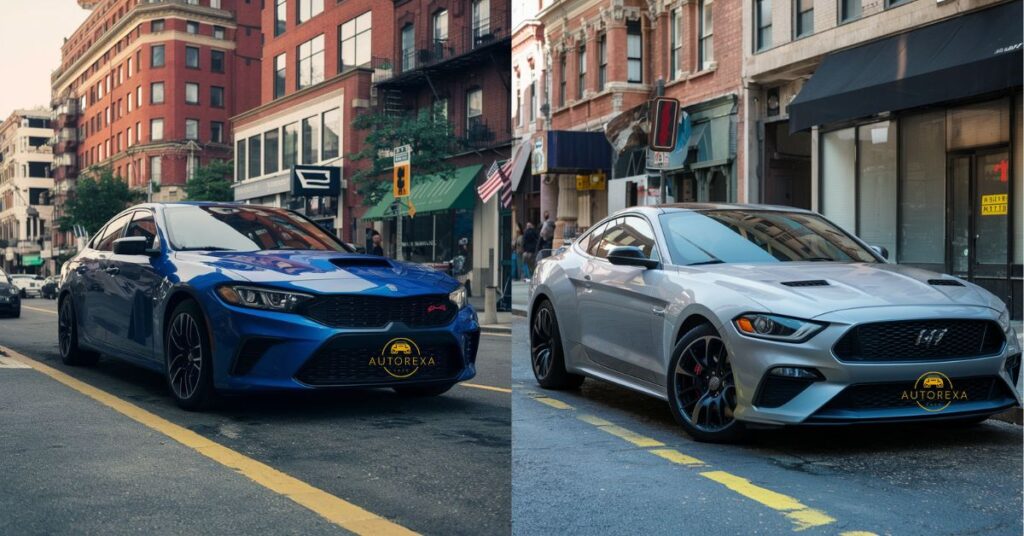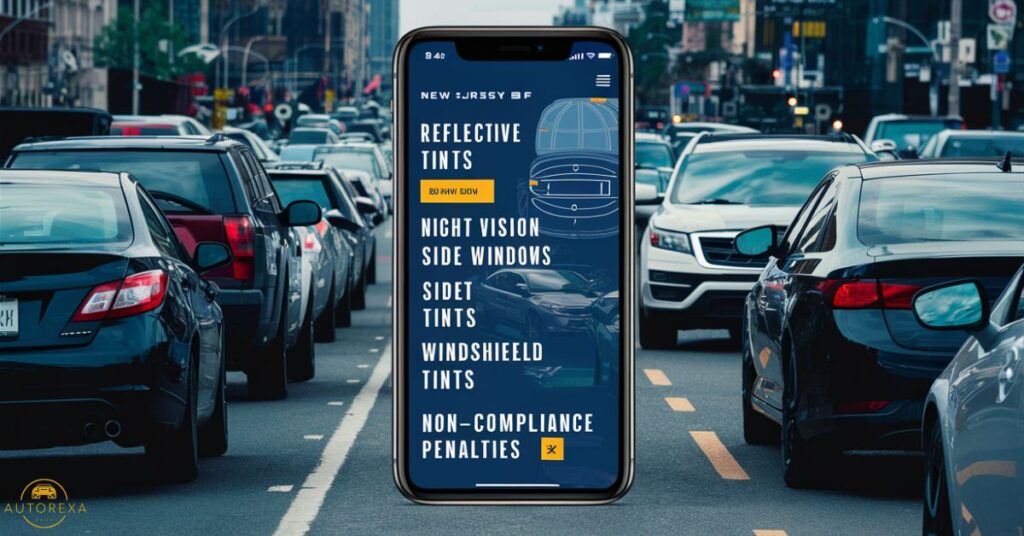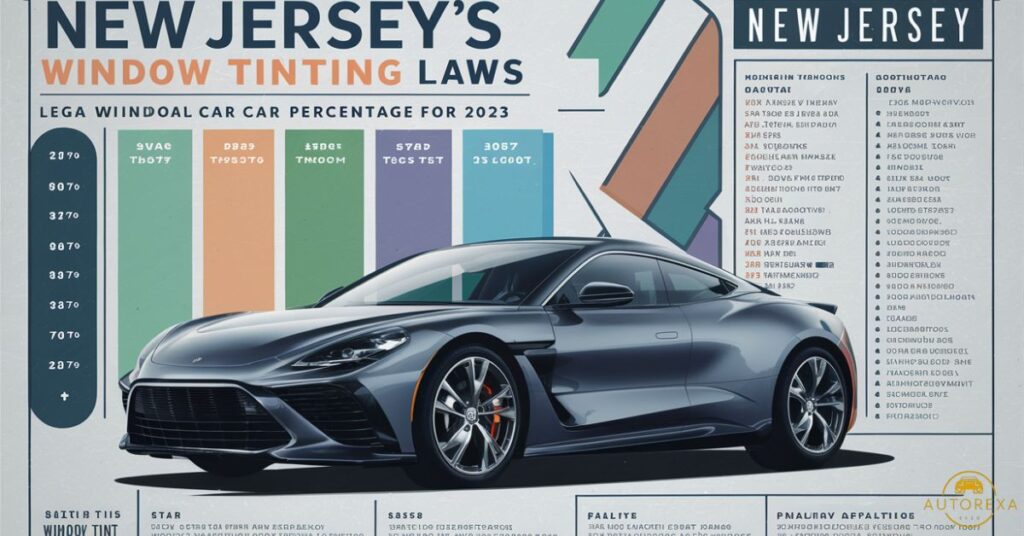Realize the distinctions of New Jersey’s window tint laws for 2023, where regulations strictly forbid any tint on your windshield or front side windows. The rules, however, allow flexibility, permitting varying degrees of darkness on the back side and rear windows. However, one of the essential things about tinting is that it can’t be a mirrored tint, whether it be any of your car’s windows – front, rear, front side, or backside.
Car Window Tint Laws for New Jersey

Navigating New Jersey’s car window tint laws requires understanding legal rules. The state mandates clear windshields and front windows for driver safety. However, drivers can choose darkness levels for back windows within legal limits, meeting personal needs.
Staying informed about New Jersey’s tint laws is crucial. Adhering ensures legal compliance and a comfortable driving experience. Drivers must balance preferences with legal requirements for a smooth ride within state guidelines.
Regular updates on the laws help drivers make informed decisions. Awareness of any changes ensures continued adherence to regulations. This proactive approach guarantees a seamless and lawful tinting experience for New Jersey drivers.
Window tint laws you can trust
Navigating window tint laws that you can trust is essential for drivers seeking clarity and compliance. These reliable regulations offer a transparent framework for tinting choices, ensuring a comprehensive understanding of the legal standards.
Also, clear guidelines minimize the risk of fines or penalties, fostering a sense of trust and security for individuals looking to personalize their vehicles.Transitioning to the importance of trustworthy window tint laws, adherence to these regulations guarantees a stress-free driving experience.
Drivers can confidently customize their vehicles within the established legal boundaries, creating a harmonious blend of personalization and compliance. This ensures that the road remains a safe and regulated environment, with individuals enjoying the freedom to express their style through window tinting.
The window tint laws you can trust is crucial for a seamless and legal tinting experience. Remaining informed and diligently following regulations prevents legal issues. It also enables individuals to enjoy a personalized driving experience within legal boundaries. Trustworthy guidelines assure drivers, allowing confident vehicle enhancement prioritizing safety and adherence to standards.
Read this Blog:Massachusetts Window Tinting Laws – 2023 New Car Tint Laws in MA
Window tint darkness in New Jersey

In New Jersey, where window tint darkness regulations hold significance, understanding the acceptable levels becomes crucial for drivers seeking a balance between personalization and road safety.
Transitioning to the specifics, the law emphasizes clarity on the front of the vehicle – both the front windshield and front side windows must remain untinted. This stringent requirement ensures optimal visibility, aligning with traffic regulations and prioritizing overall road safety.
However, when it comes to the rear of the vehicle, the scenario shifts. New Jersey law offers flexibility, allowing drivers to choose varying degrees of darkness for back side and rear windows. This nuanced approach enables individuals to personalize their vehicles while adhering to the legal boundaries and ensuring a safe driving experience.
Tint darkness for sedans

The permissible tint darkness for sedans varies by jurisdiction, with regulations typically specifying acceptable levels for front and rear windows. It’s important for sedan owners to check and comply with local window tint laws to ensure road safety and legal compliance.
Front Window Restrictions: Many regions restrict tint darkness on front windows to maintain optimal visibility for drivers and road safety.
Flexibility for Rear Windows: Regulations often allow more flexibility in tint darkness for rear windows, enabling personalization within legal limits.
Awareness is Key: Staying informed about local laws on tint darkness for sedans ensures a harmonious balance between personalization and adherence to legal requirements.
Tint darkness for SUV and vans

Tint darkness regulations for SUVs and vans vary, often allowing more flexibility for rear windows compared to front windows. Owners should be aware of local laws to ensure their tint darkness complies with legal standards.
Regulatory Variations: Tint darkness regulations for SUVs and vans vary, specifying limits for front and rear windows, ensuring legal compliance.
Enhanced Privacy: Regulations may allow more flexibility in tint darkness for rear windows, providing SUV and van owner’s options for enhanced privacy and aesthetics.
Front Window Restrictions: Many jurisdictions impose restrictions on front window tint darkness to maintain driver visibility, prioritizing road safety.
Legal Awareness: SUV and van owners should be aware of and adhere to local window tint laws to ensure compliance with acceptable darkness levels.
Window tint reflection in New Jersey

Reflective window tint in New Jersey is subject to regulations designed for addressing glare issues and enhancing road safety. Specifically, the guidelines dictate that front side windows should not have mirrored or highly reflective tint.
This stringent requirement is in place to prioritize clear visibility for drivers, reducing the potential for accidents and ensuring safe navigation on the roads. New Jersey’s approach to window tint reflection reflects a commitment to responsible tinting practices.
While the law imposes restrictions on highly reflective tint for front side windows, it simultaneously allows individuals the freedom to personalize their vehicles. This balance enables drivers to express their style through window tinting while upholding safety standards and compliance with the state’s regulations.
In principle, the regulation of window tint reflection in New Jersey serves as a thoughtful intersection between personalization and safety. Vehicle owners can enhance the aesthetics of their cars within the defined boundaries, contributing to a driving experience that is both stylish and secure.
Tint reflection for sedans
In New Jersey, tint darkness regulations for sedans specify the following,
- Front side windows: Must allow more than 50% of light.
- Back side windows: Must permit more than 35% of light.
- Rear window: Must also permit more than 35% of light.
These regulations are designed to balance personalization preferences with the need for optimal visibility and road safety. Sedan owners should be aware of and comply with these guidelines to ensure their window tinting meets legal standards in New Jersey.
Tint reflection for SUV and vans
Tint reflection regulations for SUVs and vans in New Jersey prioritize reducing glare and ensuring clear visibility.
The guidelines highlight:
- Front side windows: Should not have highly reflective or mirrored tint, prioritizing optimal driver visibility.
- Back side windows: No specific restrictions on reflective tint, allowing personalization while maintaining safety.
Community journalism for democracy
Community journalism serves as a linchpin for democracy, fostering an environment where citizens are well-informed about local issues. Local news outlets act as conduits of information, enlightening the citizenry about civic matters.
Empowering local voices is a hallmark, providing a platform for citizens to express their concerns and achievements. This empowerment contributes to a vibrant democratic culture, where civic engagement flourishes.
The community journalism scrutinizes local institutions and events, upholding transparency and accountability. It ensures the preservation of democratic ideals, thereby strengthening the foundations of democracy at both national and grassroots levels.
In doing so, it keeps citizens well-informed and engaged in democratic processes, actively shaping their localities and contributing to a robust democratic culture.
Also read this Blog:NORTH CAROLINA WINDOW TINTING LAWS – 2023 NEW CAR TINT LAWS IN NC
Tint law references
In New Jersey, tint laws prohibit any tint on windshields and front side windows. Back side and rear windows have varying darkness allowances, while mirrored or highly reflective tint is not allowed. Medical exemptions are permitted, subject to certification for specific health conditions.
| Point | Aspect | Description |
| 1 | Location | Tint laws are enforced on a state-by-state basis in the USA. |
| 2 | Windshield Tint | Many states, including New Jersey, prohibit tint on windshields. |
| 3 | Front Side Windows | Restrictions often apply to the darkness of tint on front side windows. |
| 4 | Back Side Windows | Tint darkness regulations for back side windows may vary among states. |
| 5 | Rear Window | Rules for tint darkness on rear windows also differ by state. |
| 6 | Reflective/Mirrored Tint | Some states, like New Jersey, may prohibit highly reflective or mirrored tint. |
| 7 | Medical Exemptions | Certain states allow medical exemptions for tinting, requiring certification. |
Other New Jersey window tint rules and regulations

In New Jersey, window tint rules prohibit the use of mirrored or highly reflective tint. Moreover, the regulations mandate dual side mirrors when rear windows are tinted. Familiarity with these guidelines ensures compliance when tinting windows in the state.
Dual Side Mirrors Requirement: When tinting rear windows, New Jersey mandates the installation of dual side mirrors for enhanced visibility.
Varied Darkness Allowances: Apart from specific darkness requirements, regulations allow flexibility in tint darkness for back side and rear windows.
No Certification Requirement: Unlike some states, New Jersey does not mandate tint film manufacturers to certify their products.
Medical Exemptions: New Jersey provides medical exemptions, allowing tinting for health reasons, subject to certification.
Transparent Film Requirement: All sun-screening materials applied must be transparent films and ensuring visibility is not compromised.
Strict Penalties for Violation: Violating tint laws in New Jersey can lead to fines, with the first offense carrying a maximum penalty of $1,000 and subsequent offenses facing steeper fines.
State of New Jersey Info

New Jersey state is nestled in the northeastern region of the United States is a dynamic state known for its diverse offerings:
Geographical Location: Situated on the East Coast of the United States, New Jersey enjoys proximity to major urban centers.
Capital and Urban Centers: Trenton serves as the state capital, while cities like Newark contribute to the dynamic urban landscape.
Diverse Landscapes: New Jersey boasts diverse landscapes, including coastal areas, forests, and suburban regions.
Population: With a population exceeding 9 million in the state of new jersey is densely populated and offering a mix of suburban tranquility and urban vibrancy.
Economic Vitality: New Jersey is economically robust, home to industries ranging from finance and pharmaceuticals to technology and agriculture.
Cultural Heritage: The state has a rich cultural heritage, evident in its historical sites, museums, and diverse communities.
Area: Covering approximately 8,723 square miles and New Jersey may be small in size, but it packs in a wealth of attractions and opportunities.
Frequently asked questions
Are there tint restrictions for windshields in New Jersey?
Yes, New Jersey prohibits any tint on windshields.
What darkness is allowed for front side windows in new jersey state?
In New jersey state tint is permitted on front side windows.
Is there flexibility for tint darkness on back side and rear windows?
Yes, New Jersey allows any darkness on back side and rear windows.
What are the penalties for violating New Jersey tint laws?
Violation can result in fines, with the first offense carrying a maximum penalty of $1,000 and subsequent offenses facing steeper fines.
Conclusion
New Jersey’s 2023 car tint laws prioritize safety. No tint is allowed on windshields and front windows to ensuring optimal visibility. Back and rear windows but it offer flexibility with varying darkness levels. Complying with these regulations is essential to avoid penalties, emphasizing a law-abiding and personalized driving experience.







